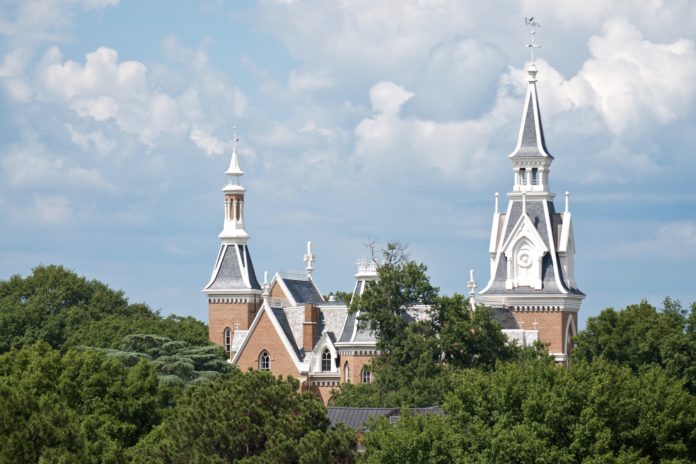MACON — For the fifth year in a row, The Princeton Review has named Mercer University to its list of America’s best colleges in the 2008 edition of the book, “Best 366 Colleges.” Only about 15 percent of the four-year colleges in America and two Canadian colleges were chosen for the book.
In its profile on Mercer, Princeton Review says: “‘Good scholarships,’ ‘challenging courses,’ an appealing ‘professor-to-student ratio, small class sizes,’ and ‘a great campus” initially convince many students to attend Mercer University in Macon—but it’s the ‘very good professors who actually care about the students’ who keep them here.” The profile goes on to quote extensively from Mercer students Princeton Review surveyed for the book. Among their candid comments on the University: “professors are very friendly and love to interact with the students” and “even the introductory courses in the School of Engineering are taught only by professors with Ph.D.s. I’ve never been taught by a (teaching assistant).”
Says Robert Franek, Princeton Review’s vice president, Publishing, “We chose schools for this book primarily for their outstanding academics. We evaluated them based on institutional data we collect about the schools, feedback from students attending them, and our visits to schools over the years. We also consider the opinions of independent college counselors, students, and parents we hear from year-long. Finally, we work to have a wide representation of colleges in the book by region, size, selectivity and character.”
The ranking lists in the 2008 edition of “Best 366 Colleges” are based on Princeton Review’s survey of 120,000 students (about 325 per campus on average) attending the 366 colleges in the book. A college’s appearance on these lists is attributable to a high consensus among its surveyed students about the subject. The 80-question survey asked students to rate their schools on several topics and report on their campus experiences at them. Ranking lists report the top 20 schools in categories that range from best professors, administration and campus food, to lists based on student body political leanings, race/class relations, sports interests and other aspects of campus life. Princeton Review does not rank the colleges in the book 1 to 366 in any single category, nor do the rankings reflect Princeton Review’s opinion of the schools.
“We are always pleased when Mercer University is recognized for the outstanding institution it is. We know that many students and their families consider these rankings in the college search process,” said Terry E. Whittum, Mercer’s senior vice president for Enrollment Management. “The rankings, however, should play a small role in the final decision. I urge all students considering Mercer University to visit our campus, meet our faculty and students, and decide for themselves if Mercer is the institution for them.”
In a “Survey Says…” sidebar in the book’s profile on Mercer, Princeton Review lists topics that Mercer students surveyed for the book were in most agreement about. The list includes: “small classes,” “great computer facilities,” “great library” and “athletic facilities are great.”
“Best 366 Colleges” is one of nearly 200 Princeton Review books published by Random House. The Princeton Review (www.PrincetonReview.com) is a New York-based company known for its test preparation, education, and college admission services. It is not affiliated with Princeton University and it is not a magazine.
Princeton Review also lists Mercer in several other publications, including the 2008 edition of “America’s Best Value Colleges” and, with Campus Compact, “Colleges with a Conscience: 81 Great Schools with Outstanding Community Involvement.”
About Mercer University:
Founded in 1833, Mercer University is a dynamic and comprehensive center of undergraduate, graduate and professional education. The University has 7,100 students; 11 schools and colleges – liberal arts, law, pharmacy, medicine, business, engineering, education, theology, music, nursing and continuing and professional studies; major campuses in Macon and Atlanta; four regional academic centers across the state; a university press; two teaching hospitals — Memorial Health University Medical Center and the Medical Center of Central Georgia; educational partnerships with Warner Robins Air Logistics Center in Warner Robins and Piedmont Healthcare in Atlanta; an engineering research center in Warner Robins; a performing arts center in Macon; and a NCAA Division I athletic program. For more information, visit www.mercer.edu.
# # #










